Business Law 6: Exam on Partnership, Agency, and Employment Law Issues
VerifiedAdded on 2022/09/15
|7
|1330
|19
Homework Assignment
AI Summary
This document provides a comprehensive response to a business law exam, addressing five key questions. The answers delve into the principle of fiduciary duty within partnerships, analyzing the responsibilities of partners and the implications of actions taken without the knowledge of others. It examines a scenario involving an accounting firm and the liabilities of partners, including a retired partner, and emphasizes the importance of partnership agreements to mitigate risk. The document also explores the law of agency, distinguishing between the authority of agents and principals, using case law to illustrate these concepts. It further addresses employment law, specifically Ontario's employment standards legislation, severance pay, and the justification for dismissal, incorporating the Bardal factors for determining reasonable notice. Finally, the document defines a dependent contractor and outlines the factors considered by the court in determining this status, applying these factors to a given case.
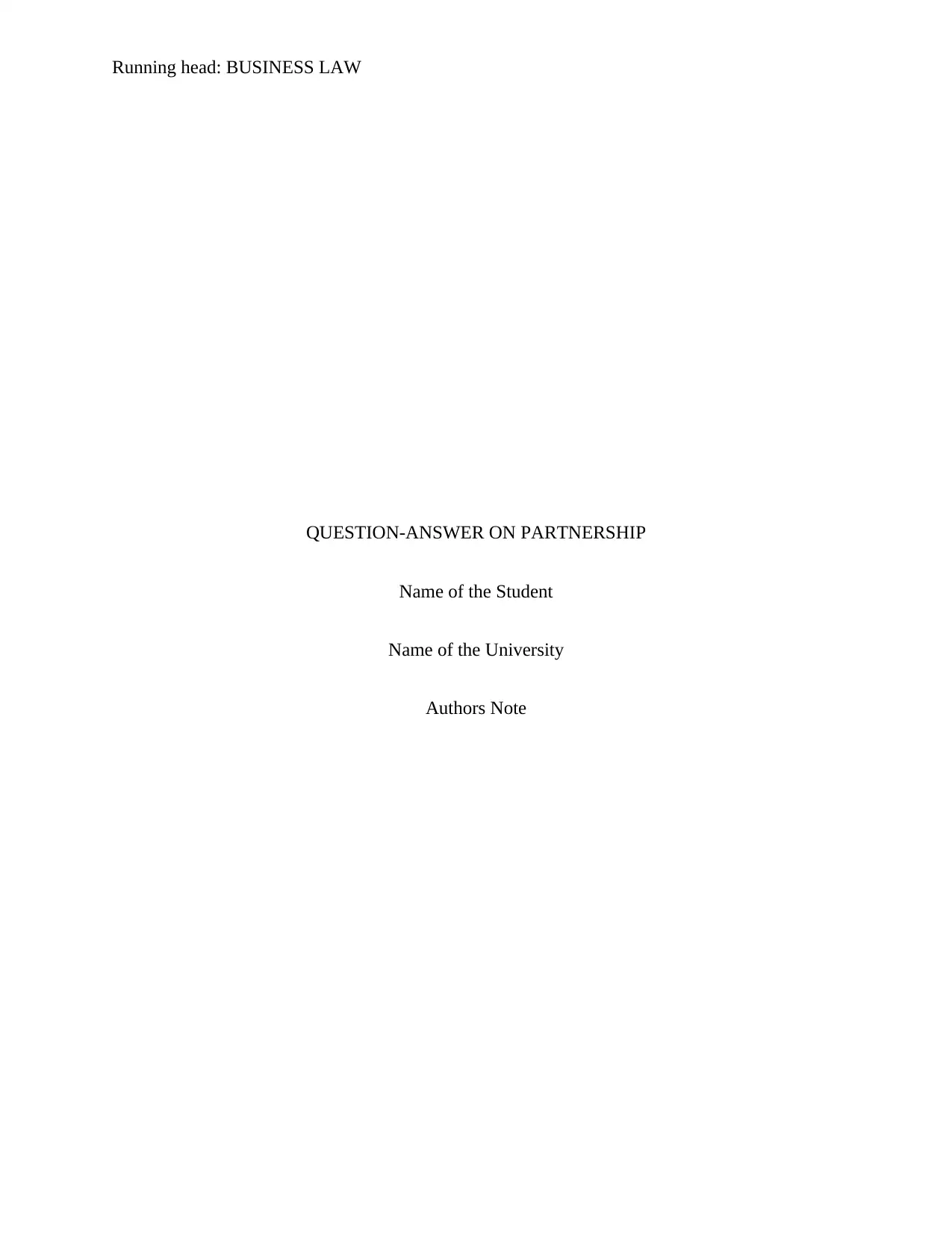
Running head: BUSINESS LAW
QUESTION-ANSWER ON PARTNERSHIP
Name of the Student
Name of the University
Authors Note
QUESTION-ANSWER ON PARTNERSHIP
Name of the Student
Name of the University
Authors Note
Paraphrase This Document
Need a fresh take? Get an instant paraphrase of this document with our AI Paraphraser
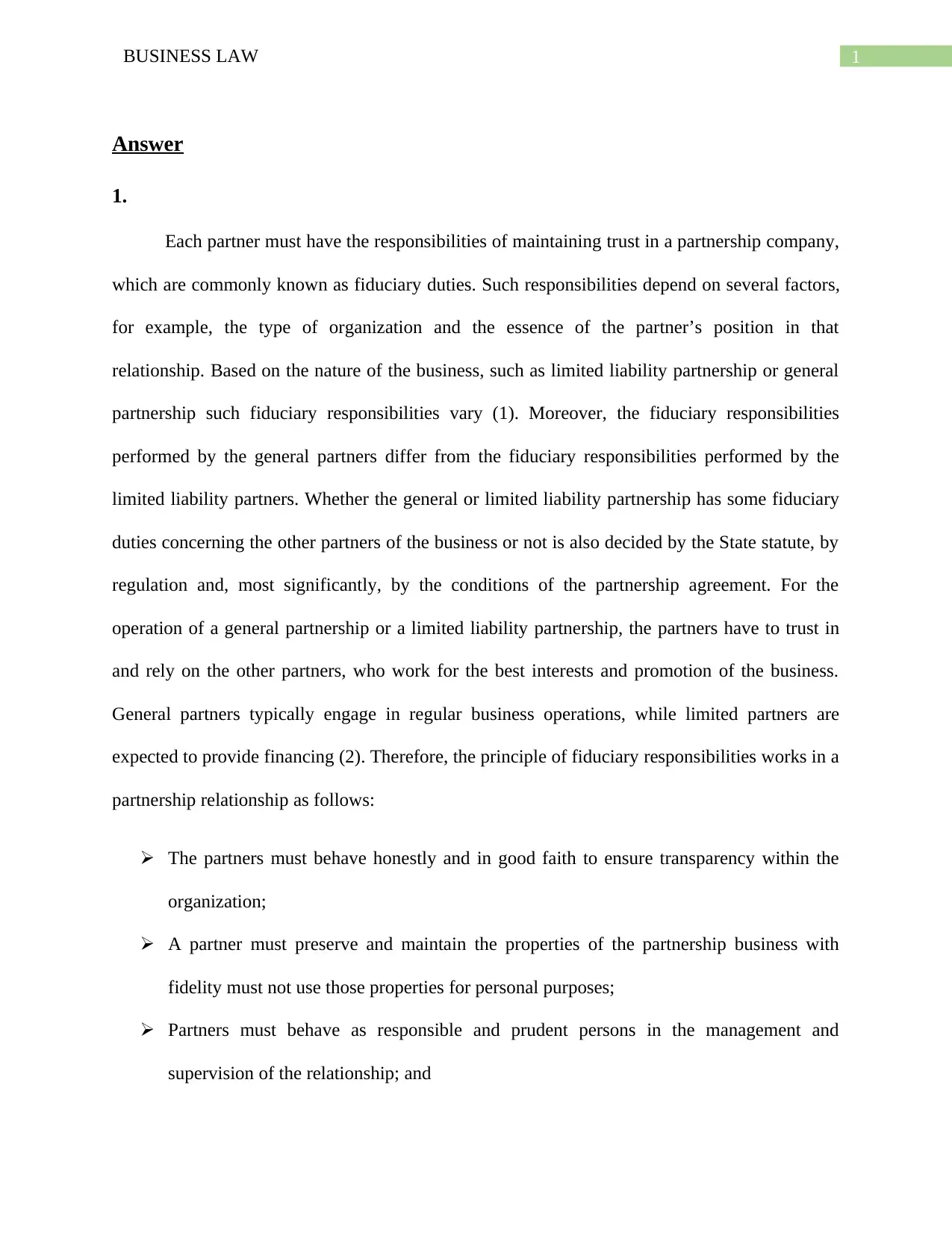
1BUSINESS LAW
Answer
1.
Each partner must have the responsibilities of maintaining trust in a partnership company,
which are commonly known as fiduciary duties. Such responsibilities depend on several factors,
for example, the type of organization and the essence of the partner’s position in that
relationship. Based on the nature of the business, such as limited liability partnership or general
partnership such fiduciary responsibilities vary (1). Moreover, the fiduciary responsibilities
performed by the general partners differ from the fiduciary responsibilities performed by the
limited liability partners. Whether the general or limited liability partnership has some fiduciary
duties concerning the other partners of the business or not is also decided by the State statute, by
regulation and, most significantly, by the conditions of the partnership agreement. For the
operation of a general partnership or a limited liability partnership, the partners have to trust in
and rely on the other partners, who work for the best interests and promotion of the business.
General partners typically engage in regular business operations, while limited partners are
expected to provide financing (2). Therefore, the principle of fiduciary responsibilities works in a
partnership relationship as follows:
The partners must behave honestly and in good faith to ensure transparency within the
organization;
A partner must preserve and maintain the properties of the partnership business with
fidelity must not use those properties for personal purposes;
Partners must behave as responsible and prudent persons in the management and
supervision of the relationship; and
Answer
1.
Each partner must have the responsibilities of maintaining trust in a partnership company,
which are commonly known as fiduciary duties. Such responsibilities depend on several factors,
for example, the type of organization and the essence of the partner’s position in that
relationship. Based on the nature of the business, such as limited liability partnership or general
partnership such fiduciary responsibilities vary (1). Moreover, the fiduciary responsibilities
performed by the general partners differ from the fiduciary responsibilities performed by the
limited liability partners. Whether the general or limited liability partnership has some fiduciary
duties concerning the other partners of the business or not is also decided by the State statute, by
regulation and, most significantly, by the conditions of the partnership agreement. For the
operation of a general partnership or a limited liability partnership, the partners have to trust in
and rely on the other partners, who work for the best interests and promotion of the business.
General partners typically engage in regular business operations, while limited partners are
expected to provide financing (2). Therefore, the principle of fiduciary responsibilities works in a
partnership relationship as follows:
The partners must behave honestly and in good faith to ensure transparency within the
organization;
A partner must preserve and maintain the properties of the partnership business with
fidelity must not use those properties for personal purposes;
Partners must behave as responsible and prudent persons in the management and
supervision of the relationship; and
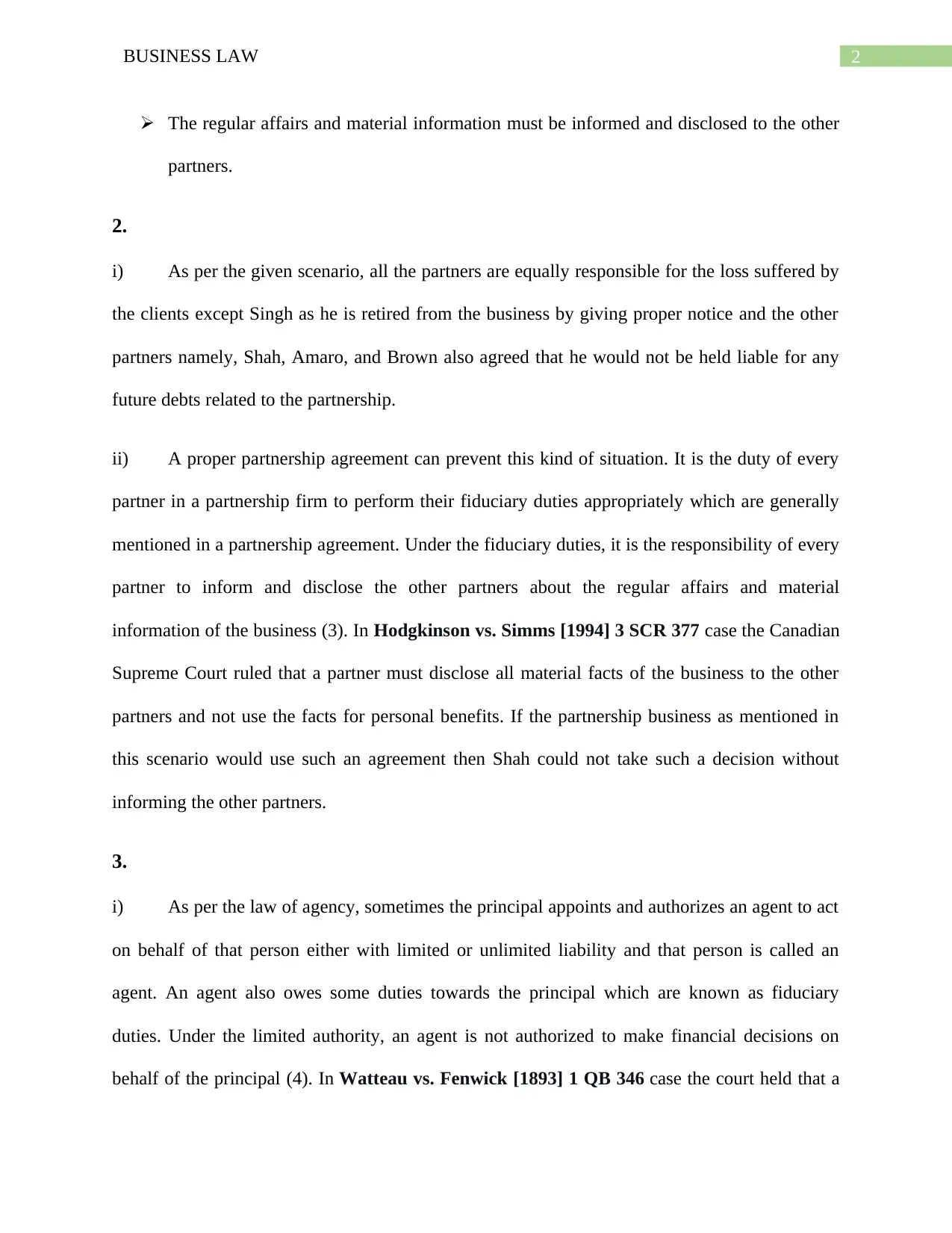
2BUSINESS LAW
The regular affairs and material information must be informed and disclosed to the other
partners.
2.
i) As per the given scenario, all the partners are equally responsible for the loss suffered by
the clients except Singh as he is retired from the business by giving proper notice and the other
partners namely, Shah, Amaro, and Brown also agreed that he would not be held liable for any
future debts related to the partnership.
ii) A proper partnership agreement can prevent this kind of situation. It is the duty of every
partner in a partnership firm to perform their fiduciary duties appropriately which are generally
mentioned in a partnership agreement. Under the fiduciary duties, it is the responsibility of every
partner to inform and disclose the other partners about the regular affairs and material
information of the business (3). In Hodgkinson vs. Simms [1994] 3 SCR 377 case the Canadian
Supreme Court ruled that a partner must disclose all material facts of the business to the other
partners and not use the facts for personal benefits. If the partnership business as mentioned in
this scenario would use such an agreement then Shah could not take such a decision without
informing the other partners.
3.
i) As per the law of agency, sometimes the principal appoints and authorizes an agent to act
on behalf of that person either with limited or unlimited liability and that person is called an
agent. An agent also owes some duties towards the principal which are known as fiduciary
duties. Under the limited authority, an agent is not authorized to make financial decisions on
behalf of the principal (4). In Watteau vs. Fenwick [1893] 1 QB 346 case the court held that a
The regular affairs and material information must be informed and disclosed to the other
partners.
2.
i) As per the given scenario, all the partners are equally responsible for the loss suffered by
the clients except Singh as he is retired from the business by giving proper notice and the other
partners namely, Shah, Amaro, and Brown also agreed that he would not be held liable for any
future debts related to the partnership.
ii) A proper partnership agreement can prevent this kind of situation. It is the duty of every
partner in a partnership firm to perform their fiduciary duties appropriately which are generally
mentioned in a partnership agreement. Under the fiduciary duties, it is the responsibility of every
partner to inform and disclose the other partners about the regular affairs and material
information of the business (3). In Hodgkinson vs. Simms [1994] 3 SCR 377 case the Canadian
Supreme Court ruled that a partner must disclose all material facts of the business to the other
partners and not use the facts for personal benefits. If the partnership business as mentioned in
this scenario would use such an agreement then Shah could not take such a decision without
informing the other partners.
3.
i) As per the law of agency, sometimes the principal appoints and authorizes an agent to act
on behalf of that person either with limited or unlimited liability and that person is called an
agent. An agent also owes some duties towards the principal which are known as fiduciary
duties. Under the limited authority, an agent is not authorized to make financial decisions on
behalf of the principal (4). In Watteau vs. Fenwick [1893] 1 QB 346 case the court held that a
⊘ This is a preview!⊘
Do you want full access?
Subscribe today to unlock all pages.

Trusted by 1+ million students worldwide
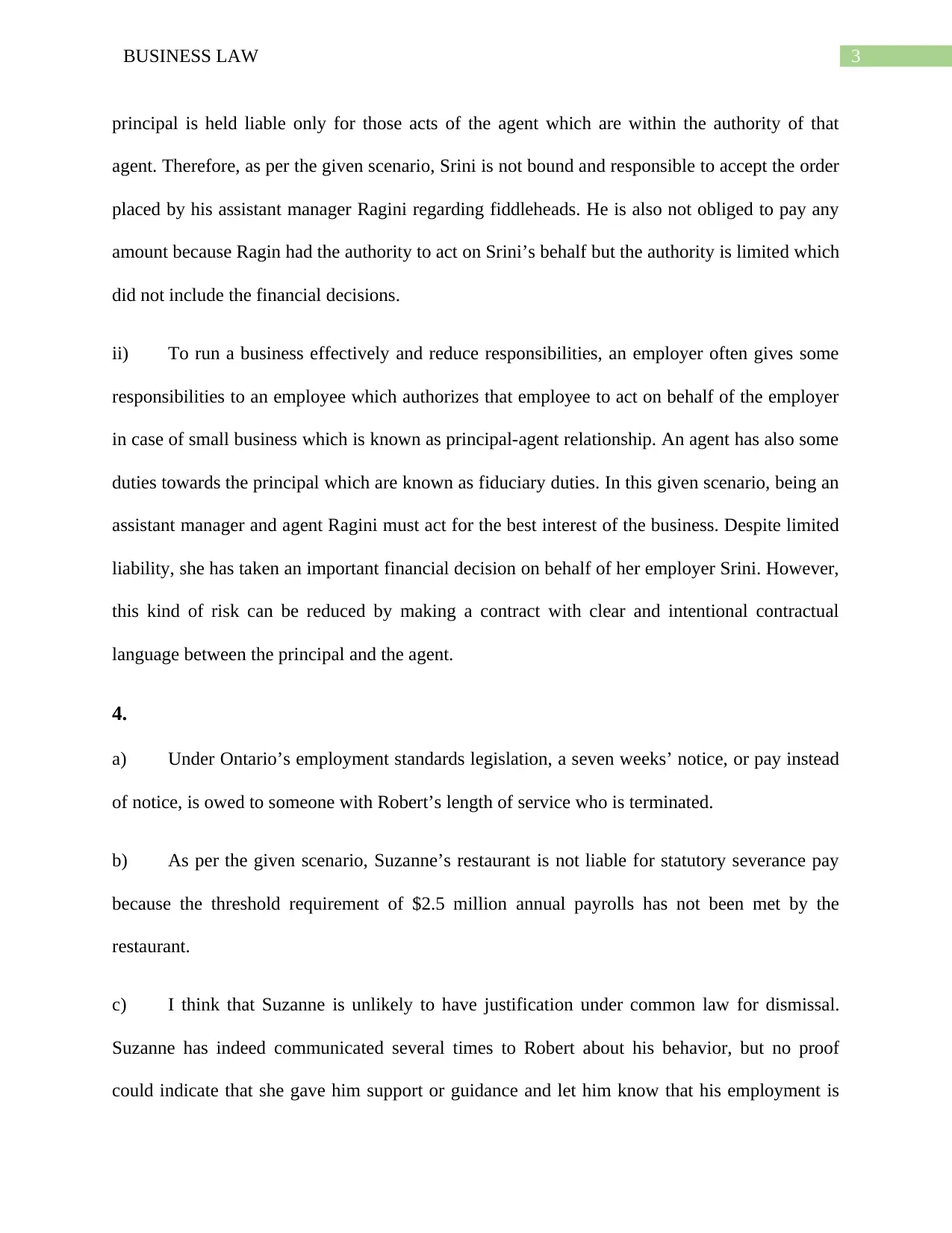
3BUSINESS LAW
principal is held liable only for those acts of the agent which are within the authority of that
agent. Therefore, as per the given scenario, Srini is not bound and responsible to accept the order
placed by his assistant manager Ragini regarding fiddleheads. He is also not obliged to pay any
amount because Ragin had the authority to act on Srini’s behalf but the authority is limited which
did not include the financial decisions.
ii) To run a business effectively and reduce responsibilities, an employer often gives some
responsibilities to an employee which authorizes that employee to act on behalf of the employer
in case of small business which is known as principal-agent relationship. An agent has also some
duties towards the principal which are known as fiduciary duties. In this given scenario, being an
assistant manager and agent Ragini must act for the best interest of the business. Despite limited
liability, she has taken an important financial decision on behalf of her employer Srini. However,
this kind of risk can be reduced by making a contract with clear and intentional contractual
language between the principal and the agent.
4.
a) Under Ontario’s employment standards legislation, a seven weeks’ notice, or pay instead
of notice, is owed to someone with Robert’s length of service who is terminated.
b) As per the given scenario, Suzanne’s restaurant is not liable for statutory severance pay
because the threshold requirement of $2.5 million annual payrolls has not been met by the
restaurant.
c) I think that Suzanne is unlikely to have justification under common law for dismissal.
Suzanne has indeed communicated several times to Robert about his behavior, but no proof
could indicate that she gave him support or guidance and let him know that his employment is
principal is held liable only for those acts of the agent which are within the authority of that
agent. Therefore, as per the given scenario, Srini is not bound and responsible to accept the order
placed by his assistant manager Ragini regarding fiddleheads. He is also not obliged to pay any
amount because Ragin had the authority to act on Srini’s behalf but the authority is limited which
did not include the financial decisions.
ii) To run a business effectively and reduce responsibilities, an employer often gives some
responsibilities to an employee which authorizes that employee to act on behalf of the employer
in case of small business which is known as principal-agent relationship. An agent has also some
duties towards the principal which are known as fiduciary duties. In this given scenario, being an
assistant manager and agent Ragini must act for the best interest of the business. Despite limited
liability, she has taken an important financial decision on behalf of her employer Srini. However,
this kind of risk can be reduced by making a contract with clear and intentional contractual
language between the principal and the agent.
4.
a) Under Ontario’s employment standards legislation, a seven weeks’ notice, or pay instead
of notice, is owed to someone with Robert’s length of service who is terminated.
b) As per the given scenario, Suzanne’s restaurant is not liable for statutory severance pay
because the threshold requirement of $2.5 million annual payrolls has not been met by the
restaurant.
c) I think that Suzanne is unlikely to have justification under common law for dismissal.
Suzanne has indeed communicated several times to Robert about his behavior, but no proof
could indicate that she gave him support or guidance and let him know that his employment is
Paraphrase This Document
Need a fresh take? Get an instant paraphrase of this document with our AI Paraphraser
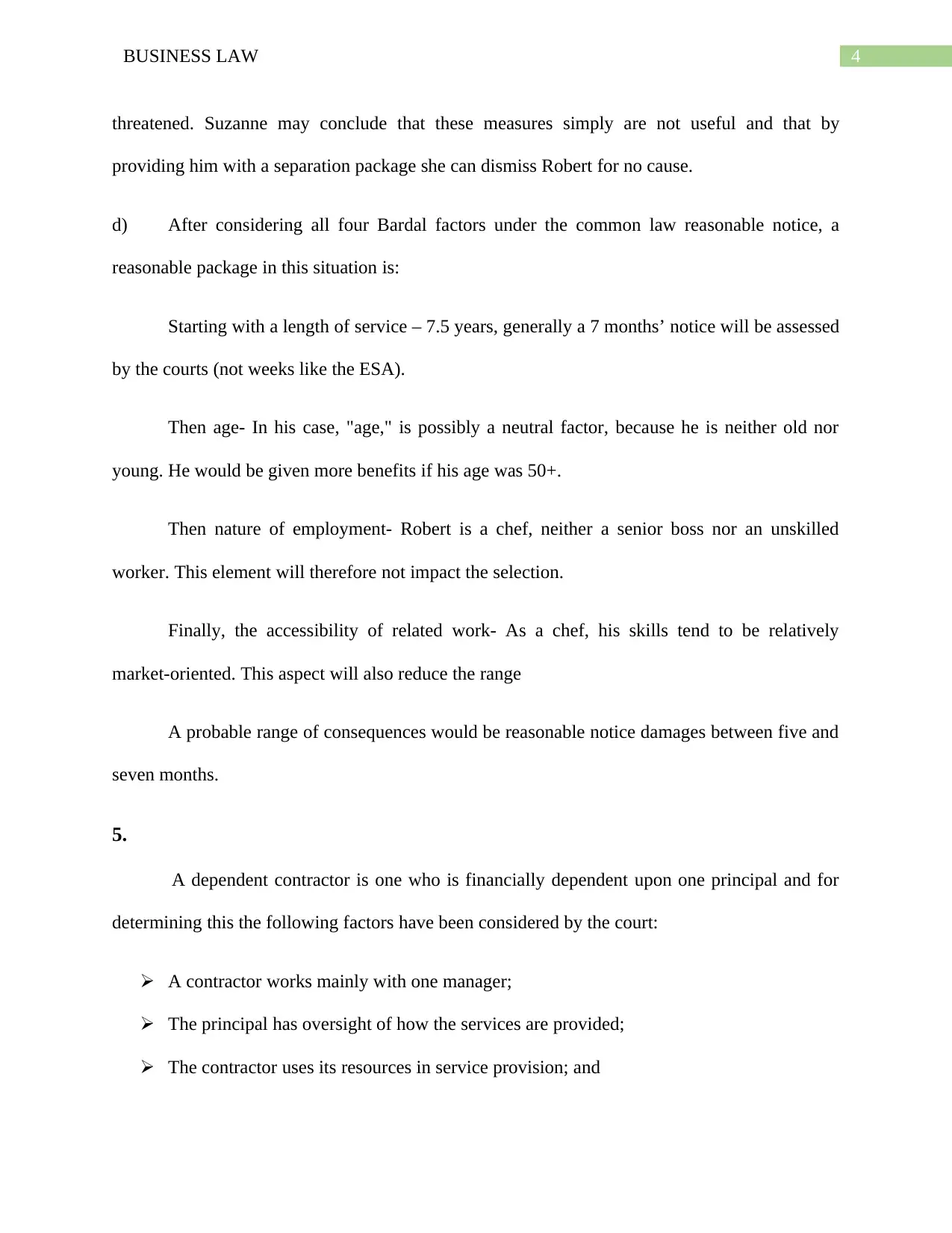
4BUSINESS LAW
threatened. Suzanne may conclude that these measures simply are not useful and that by
providing him with a separation package she can dismiss Robert for no cause.
d) After considering all four Bardal factors under the common law reasonable notice, a
reasonable package in this situation is:
Starting with a length of service – 7.5 years, generally a 7 months’ notice will be assessed
by the courts (not weeks like the ESA).
Then age- In his case, "age," is possibly a neutral factor, because he is neither old nor
young. He would be given more benefits if his age was 50+.
Then nature of employment- Robert is a chef, neither a senior boss nor an unskilled
worker. This element will therefore not impact the selection.
Finally, the accessibility of related work- As a chef, his skills tend to be relatively
market-oriented. This aspect will also reduce the range
A probable range of consequences would be reasonable notice damages between five and
seven months.
5.
A dependent contractor is one who is financially dependent upon one principal and for
determining this the following factors have been considered by the court:
A contractor works mainly with one manager;
The principal has oversight of how the services are provided;
The contractor uses its resources in service provision; and
threatened. Suzanne may conclude that these measures simply are not useful and that by
providing him with a separation package she can dismiss Robert for no cause.
d) After considering all four Bardal factors under the common law reasonable notice, a
reasonable package in this situation is:
Starting with a length of service – 7.5 years, generally a 7 months’ notice will be assessed
by the courts (not weeks like the ESA).
Then age- In his case, "age," is possibly a neutral factor, because he is neither old nor
young. He would be given more benefits if his age was 50+.
Then nature of employment- Robert is a chef, neither a senior boss nor an unskilled
worker. This element will therefore not impact the selection.
Finally, the accessibility of related work- As a chef, his skills tend to be relatively
market-oriented. This aspect will also reduce the range
A probable range of consequences would be reasonable notice damages between five and
seven months.
5.
A dependent contractor is one who is financially dependent upon one principal and for
determining this the following factors have been considered by the court:
A contractor works mainly with one manager;
The principal has oversight of how the services are provided;
The contractor uses its resources in service provision; and
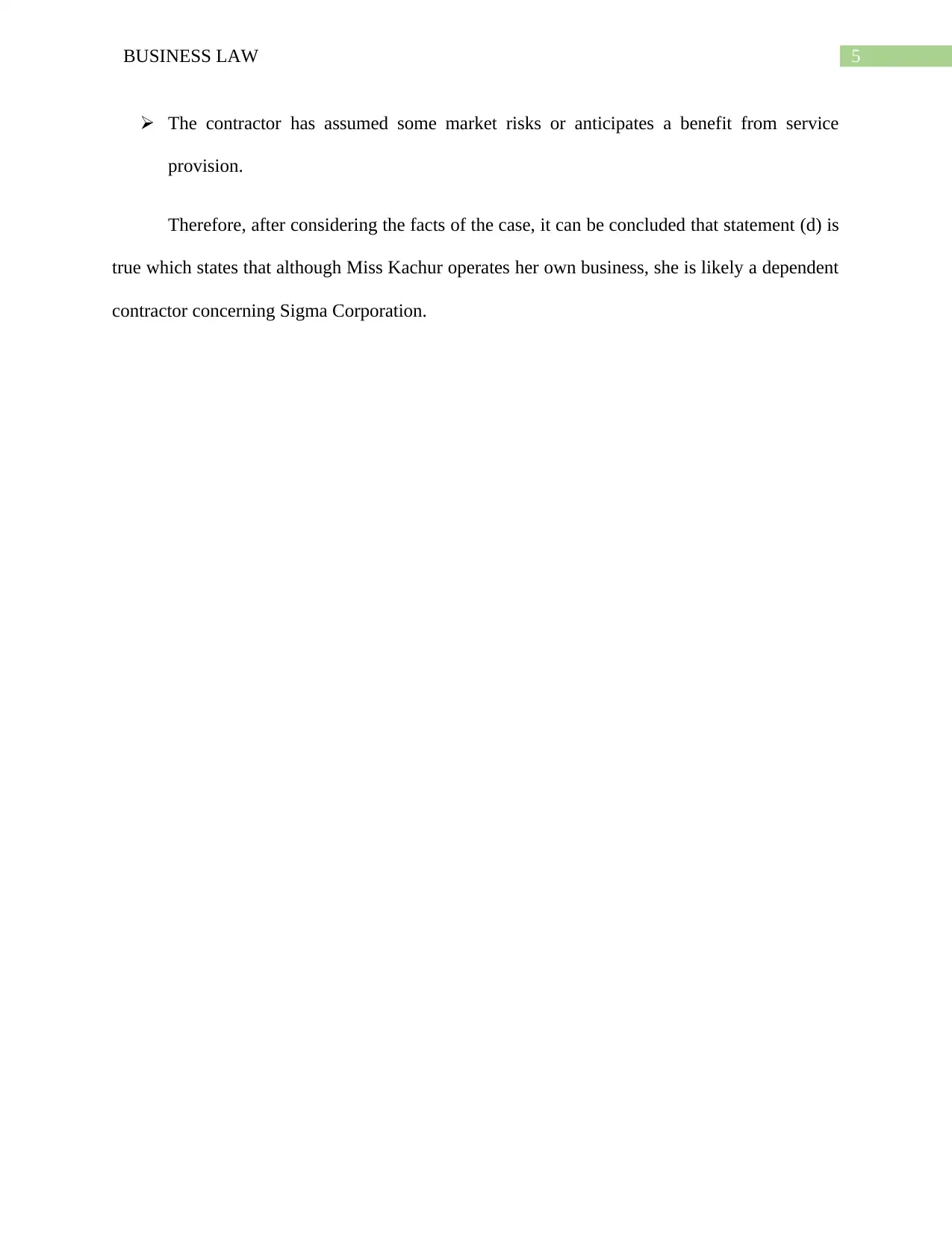
5BUSINESS LAW
The contractor has assumed some market risks or anticipates a benefit from service
provision.
Therefore, after considering the facts of the case, it can be concluded that statement (d) is
true which states that although Miss Kachur operates her own business, she is likely a dependent
contractor concerning Sigma Corporation.
The contractor has assumed some market risks or anticipates a benefit from service
provision.
Therefore, after considering the facts of the case, it can be concluded that statement (d) is
true which states that although Miss Kachur operates her own business, she is likely a dependent
contractor concerning Sigma Corporation.
⊘ This is a preview!⊘
Do you want full access?
Subscribe today to unlock all pages.

Trusted by 1+ million students worldwide
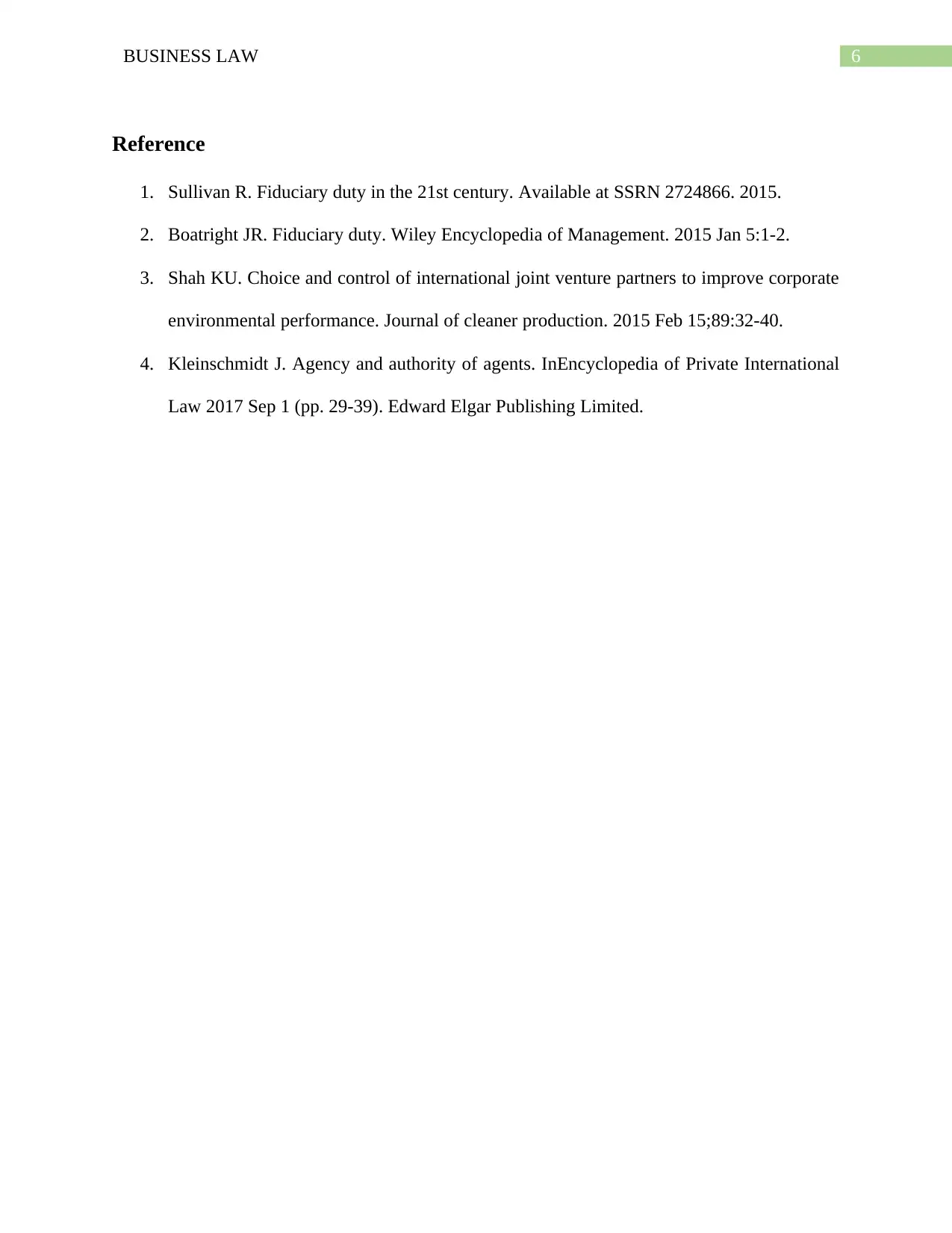
6BUSINESS LAW
Reference
1. Sullivan R. Fiduciary duty in the 21st century. Available at SSRN 2724866. 2015.
2. Boatright JR. Fiduciary duty. Wiley Encyclopedia of Management. 2015 Jan 5:1-2.
3. Shah KU. Choice and control of international joint venture partners to improve corporate
environmental performance. Journal of cleaner production. 2015 Feb 15;89:32-40.
4. Kleinschmidt J. Agency and authority of agents. InEncyclopedia of Private International
Law 2017 Sep 1 (pp. 29-39). Edward Elgar Publishing Limited.
Reference
1. Sullivan R. Fiduciary duty in the 21st century. Available at SSRN 2724866. 2015.
2. Boatright JR. Fiduciary duty. Wiley Encyclopedia of Management. 2015 Jan 5:1-2.
3. Shah KU. Choice and control of international joint venture partners to improve corporate
environmental performance. Journal of cleaner production. 2015 Feb 15;89:32-40.
4. Kleinschmidt J. Agency and authority of agents. InEncyclopedia of Private International
Law 2017 Sep 1 (pp. 29-39). Edward Elgar Publishing Limited.
1 out of 7
Related Documents
Your All-in-One AI-Powered Toolkit for Academic Success.
+13062052269
info@desklib.com
Available 24*7 on WhatsApp / Email
![[object Object]](/_next/static/media/star-bottom.7253800d.svg)
Unlock your academic potential
Copyright © 2020–2025 A2Z Services. All Rights Reserved. Developed and managed by ZUCOL.





